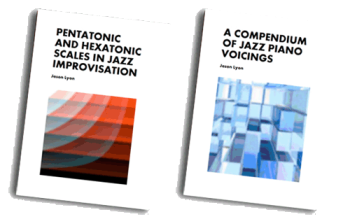
Bilbao parties. Without pointy hoods…
The point of this week’s post isn’t confined to Metheny tunes – it’s just that there are a couple we’ve happened to play recently that illustrate it nicely.
The two tunes I’ll reference are Song for Bilbao and Question & Answer. They’re both characterised by rather floaty harmony on the A sections and contrasting, very fast, very pungent movement on the Bs.
Now while you can knock yourself out working on the Bs, actually all you really have to do is outline the changes. It’s what the hotshots do on the tunes they themselves wrote – it’s exactly what’s intended and required. It’s appropriate.
In a sense, tunes like this are kindred to earlier things like Yes or No or The Night Has a Thousand Eyes, which feature contrasting sections of fairly static pseudo-modal stuff and active functional harmonic motion. You tend to wig out on the former and get more “straight” on the latter, keeping the distinction clear.
So in Bilbao we have a very open and clear modal landscape on the A sections – C7sus to C Locrian and back again. I can imagine a crisp sky and a street brass ensemble blaring out a powerful folk melody. There’s something vibrant about that part of the world – simultaneously and fiercely ancient and modern, but never dull.
Then the folk band goes nuts. The B section unleashes a fast series of really quite simple triads over a 6/8 rhythm. You honestly can get everything you need out of this section with not much more than triad inversions as F goes to Bb, to Eb to F to Db to Eb to F to G7 and back to… our C7sus sound at the top of the final A.
Well, that’s the Tales from the Hudson version anyway.  I can’t recall the exact details for Q&A, but there’s a similar concept at work. I think it’s basically fairly typical G minorish motion on the A sections, then fast Coltrane-type shenanigens on the B. You can strive for more if you wish, but when the B comes around just nailing the triads or sevenths sounds great.
I can’t recall the exact details for Q&A, but there’s a similar concept at work. I think it’s basically fairly typical G minorish motion on the A sections, then fast Coltrane-type shenanigens on the B. You can strive for more if you wish, but when the B comes around just nailing the triads or sevenths sounds great.
It’s the contrast that matters – be true to the spirit of the tune. Give it what it needs, and remember, you can overfuss things and bust them.
I think tunes like this really emphasise the importance of feeling the why and not just the what of the harmony. Whatever the tune.





Leave a Comment